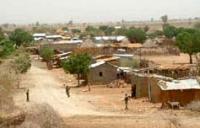







|
News and Information
Eritrea-Ethiopia: Stalemate Could Lead to War, Eritrean Gov't Say
| April 5, 2005 |
 UN Integrated Regional Information Networks UN Integrated Regional Information Networks
April 5, 2005
Posted to the web April 5, 2005
Asmara
The continuing stalemate between Ethiopia and Eritrea could lead to another war, a senior Eritrean government official said on Friday, noting that under international law, Ethiopia continued to occupy Eritrean territory.
Under the Algiers Peace Agreement of December 2000 - which ended a two-year war between the two countries - they agreed to accept the decision of an independent boundary commission on where the border between them should be.
But after the Eritrea-Ethiopia Boundary Commission (EEBC) presented its conclusions in April 2002, Ethiopia rejected the ruling.
In November last year, Ethiopian Prime Minister Meles Zenawi announced a five-point peace plan that said that it accepted the ruling "in principle" but insisted on dialogue first.
Eritrea, on the other hand, insisted on full demarcation of the boundary as set out in the EEBC report.
Efforts by the UN and international community to resolve the situation and demarcate the Ethiopia-Eritrea frontier have so far been unsuccessful.
"What is clear is that the present scenario is not sustainable," said Yemane Ghebremeskel, director of the Eritrean Office of President, on Friday.
"Both countries have mobilised troops for the last six years. And if there is no light at the end of the tunnel, if the peace process is not progressing, obviously that will set in motion a different set of factors," Yemane said.
On Thursday, the senior UN peacekeeping official in the region, Legwaila Joseph Legwaila, also said that the continuing stalemate could lead to war, and appealed to the international community to get more involved.
"Those among Ethiopia's and Eritrea's bilateral friends and development partners with clout should continue to impress it upon the leadership in both countries that engaging in direct, unconditional, broad dialogue aimed at improving their bilateral relations would be in the best long-term interests for the two countries," said Legwaila.
Meanwhile, Ethiopians continue to live in areas that the EEBC decission said were Eritrean, such as the border town of Badme. A recent report by the UN said that Ethiopia had also undertaken new construction in such areas.
"This is a question of occupation," said Yemane.
"Ethiopia does not accept the ruling of the [EEBC] decision and that is a violation of the peace agreement. It is also a violation of Eritrea's territorial integrity and sovereignty, so it is a violation of the UN charter," he said.
More than 70,000 people were killed during the 1998-2000 war, and the two national armies continue to face each other across a 25 km-wide demilitarised zone, patrolled by some 3,300 peacekeepers.
In December, more than 40,000 extra Ethiopian troops began to move up towards the border area for reasons that are still not altogether clear. Ethiopia described the move as "defensive"; Eritrea called it provocative.
In February, the EEBC invited both parties to meet in London. Eritrea accepted the invitation, but Ethiopia refused.
In March, the UN Security Council extended the mandate of UN peacekeepers in the region for another six months.
"What we would have liked to have seen, and what the Security Council should do, is send a clear message to the Ethiopians that it has to abide by the decision of the boundary commission," Yemane said.
"It has to allow and facilitate demarcation without equivocation, without conditionalities, and without further delay," he said.
He also talked about possible dividends of peace: "The focus now [in Eritrea] is on development, but also on defence. Our focus would [otherwise] be geared single-mindedly to development."
"And I guess the same would be for Ethiopia. If there is a better regional climate, it would boost regional trade, it will boost other factors that are critical for development," Yemane noted.
Relevant Links
East Africa
Eritrea
Arms and Military Affairs
Post-Conflict Challenges
Civil War and Communal Conflict
International Organizations and Africa
Ethiopia
Peacekeeping and Conflict Resolution
Ethiopian officials declined to respond to the statements made by Yemane and Legwaila.
[ This report does not necessarily reflect the views of the United Nations ] |
Source: www.allafrica.com |
| http://allafrica.com/stories/200504050401.html |
|
| Support Caprivi Freedom |
Fill out the form below to become a member of this site and receive our regular newsletter.
|

|

